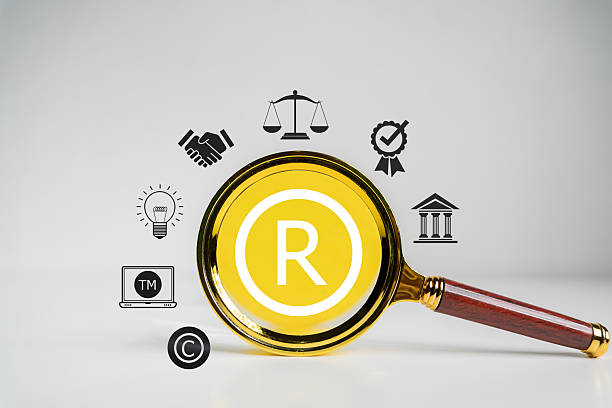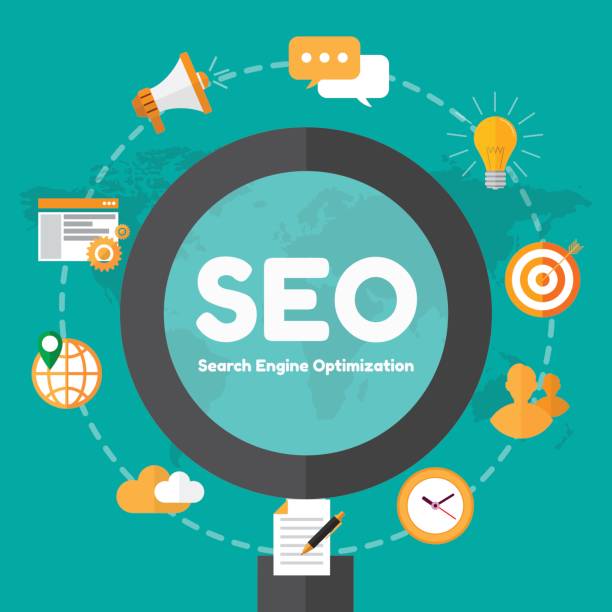Introduction to Off-Page SEO and Its Importance

In today’s highly competitive world, being seen among the multitude of websites requires a deep understanding of Search Engine Optimization (SEO).
One of the most important pillars of this optimization is #Off_Page_SEO or Off-page SEO.
Off-page SEO refers to a set of actions performed outside your website, aiming to increase its authority, domain power, and ultimately improve your site’s ranking in search results.
These actions include #link_building, receiving social signals, and increasing brand awareness.
Simply put, Off-page SEO is like collecting testimonials for your business; the more credible and numerous testimonials you have, the more search engines will trust you.
The importance of Off-page SEO goes beyond a simple ranking factor.
Indeed, backlinks (links from other sites to yours) are still one of the strongest signals for Google’s algorithms.
A comprehensive Off-page SEO strategy demonstrates to search engines that your site is a valuable, authoritative, and trustworthy resource.
Without focusing on Off-page SEO, even if your site’s internal content is exceptional and well-optimized for On-page SEO, competing with powerful and established sites will be very difficult.
This educational and explanatory approach helps you understand why off-site activities are as crucial as on-site activities.
The more your #domain_authority increases through credible links, the higher your chances of ranking for relevant keywords.
Off-page optimization is a continuous process that requires patience and persistence, but its results can be transformative.
Do you know that a weak corporate website costs you many opportunities daily? Solve this problem forever with professional corporate website design by Rasavab!
✅ Create a powerful and reliable image for your brand
✅ Targeted attraction of new customers and increased sales
⚡ [Receive Free Website Design Consultation]
Analyzing Key Factors in Successful Off-Page SEO

To have a successful Off-page SEO strategy, it is necessary to carefully analyze and identify the key factors influencing it.
The most important and influential factor in Off-page SEO is, without a doubt, #backlinks.
Backlinks are links that point from other websites to your website and are considered a “vote of confidence” by Google.
However, not every backlink is valuable; the quality, thematic relevance, and domain authority of the linking site are of high importance.
One backlink from a reputable and relevant site is thousands of times more valuable than dozens of backlinks from low-quality and spammy sites.
Various tutorials in this area can help you identify high-quality backlinks.
In addition to backlinks, #social_signals also play a significant role in Off-page SEO.
Sharing your content on platforms like Twitter, LinkedIn, Facebook, and Instagram, although not directly acting as backlinks, indicates the popularity and attractiveness of your content.
These signals can indirectly influence your site’s ranking and let search engines know that your content is attracting user attention.
Branding and brand mentions on other websites, even without direct links, are also influential factors.
Google looks for sites recognized as authorities in their industry, and mentions of your brand in articles, news, or forums indicate your reputation and credibility.
Local SEO, for physical businesses, is also a vital part of off-page optimization, which includes receiving positive reviews on Google Maps, listing the business in local directories, and increasing online presence in a specific geographic area.
This is a comprehensive guide to understanding the various dimensions of Off-page SEO.
Effective Link Building Strategies in Off-Page SEO

Link building is one of the core components of any successful #Off_Page_SEO, and to achieve better rankings in search engines, it must be done professionally and strategically.
One of the most effective methods is #Guest_Posting; you write high-quality content for a relevant website in your niche and, in return, receive one or two backlinks to your site.
This method not only provides you with backlinks but also enhances your credibility as an expert in your industry.
Another method, #external_link_building, is through Broken Link Building.
In this strategy, you look for broken links on other websites and suggest your relevant content as a replacement.
Building links through Resource Pages is also a smart strategy.
Many websites have pages that provide a list of useful resources in a specific field; if your content is high-quality and relevant, you can request them to add a link to your site to this list.
Competitive analysis is also very important in this regard; by using SEO tools, you can examine your competitors’ backlinks and identify new link-building opportunities.
This is a practical tutorial that helps you approach link building with a broader perspective.
Below, a table of the main types of links and their characteristics is provided to help you better understand:
| Link Type | Description | SEO Impact |
|---|---|---|
| DoFollow | Transfers SEO value from the source site to the destination site. | Very High |
| NoFollow | Instructs search engines not to transfer SEO value. | Indirect (Traffic, Branding) |
| Sponsored | Paid links created for advertising purposes. | With mandatory nofollow/sponsored rel |
| UGC (User Generated Content) | Links created by users (e.g., in comments). | Indirect (Content Exposure) |
Identifying and Avoiding Harmful Links
![]()
In the path to improving Off-page SEO, just as building quality links is crucial, identifying and avoiding #spam_links and harmful links is also of paramount importance.
Toxic Links are links that point to your site from low-quality, irrelevant, or spam-filled websites.
These links not only fail to increase your credibility but can also lead to #Google_penalties on your site and severely reduce your ranking.
Google, with its algorithms, deals harshly with unnatural and manipulated links, so a precise tutorial in this area is essential for every webmaster.
How to identify harmful links? Signs of toxic links include links from very low-authority domains, sites with different and irrelevant languages, sites with copied or spam content, paid links without nofollow/sponsored tags, and a high number of links from a specific domain.
Using SEO tools like Ahrefs or SEMrush can greatly assist in identifying these links.
After identification, the important step is Disavow (link disavowal).
Google’s Disavow Tool allows you to tell Google that you do not wish to receive credit from these specific links and do not take responsibility for them.
This guide helps you prevent potential damage to your site’s #SEO_security and maintain a healthy and strong backlink profile for off-page optimization.
Avoiding mass purchases of low-quality backlinks and focusing on organic and relevant links is the key to long-term success in this aspect of Off-page SEO.
Are you dissatisfied with your e-commerce site’s low sales?
Rasavab is your solution for having a professional and high-selling e-commerce website.
✅ Significant increase in sales and revenue
✅ Easy and enjoyable shopping experience for customers
⚡ Get a free consultation from Rasavab right now!
The Role of Thought-Provoking and Engaging Content in Link Attraction

In today’s world, content is king, and this principle applies not only to On-page SEO but also to Off-page SEO.
One of the most effective ways to naturally attract backlinks is to produce #engaging_content and unique content that naturally encourages users and other websites to link to you.
But how can you produce content that is not only informative and useful but can also #attract_links and have the potential for #viral_marketing? The answer lies in creating thought-provoking and entertaining content.
Thought-provoking content is content that is stimulating and encourages discussion and exchange of ideas.
This type of content can include in-depth articles with new perspectives, challenging research results, or even predictive analyses of an industry’s future.
The goal is to challenge readers and encourage them to express their opinions and share your content.
When you present controversial yet well-reasoned content, the chances of bloggers, journalists, and other experts in your field referring to it and linking to it increase significantly.
On the other hand, entertaining content, such as creative infographics, engaging videos, online contests, or inspiring stories, has high potential for widespread sharing on social media and websites.
This type of content can naturally attract links from websites looking for engaging content for their audience.
For instance, an interesting case study or an in-depth analytical report on a specific trend, accompanied by attractive visual data, can quickly go viral on social networks and ultimately lead to valuable backlinks.
Therefore, an important part of being analytical in Off-page SEO is knowing what kind of content is not only appealing to your users but also has the potential for natural link building.
Utilizing Social Media and Branding in Off-Page SEO
![]()
In today’s Off-page SEO ecosystem, #social_networks are no longer just tools for entertainment or personal communication; instead, they have become powerful tools for branding and generating #social_signals that can indirectly influence your ranking in search engines.
Although direct links from social media are often “nofollow” and do not directly transfer SEO authority, an active and effective presence on these platforms can offer countless benefits for your Off-page SEO.
This is an important lesson that should not be overlooked.
When your content is shared on social media, gets likes, receives comments, and goes viral, these activities send signals to search engines indicating the popularity and relevance of your content.
These signals can help increase your brand’s visibility and, ultimately, lead to more organic traffic and even attract natural links.
For example, a trending tweet might be seen by a blogger who then decides to link to your original article.
Branding through social media includes creating complete profiles, consistently publishing quality content, interacting with your audience, and responding to their comments and questions.
The more recognized and trustworthy your brand is, the more people will talk about you, share your content, and link to it.
These “Brand Mentions,” even without direct links, indicate to Google that you are a real and recognized entity in the online space and indirectly help improve your credibility and authority.
Therefore, a strong social media strategy is an essential guide for strengthening your Off-page SEO and expanding your online presence.
Essential Tools for Off-Page SEO Analysis and Monitoring

To manage and continuously improve your Off-page SEO, using appropriate #SEO_tools is essential.
These tools allow you to analyze your backlink profile and that of competitors, identify new link-building opportunities, and #monitor_SEO the overall status of your site’s off-page optimization.
Knowing and utilizing these specialized tools can make a significant difference in the success of your Off-page SEO strategy.
Among the most widely used tools are Ahrefs and SEMrush.
These two powerful tools provide comprehensive and precise information about backlinks (including quantity, quality, anchor text, and referring domains), keywords, and competitor analysis.
Ahrefs is particularly popular for backlink analysis and identifying new link-building opportunities.
SEMrush, in addition to backlinks, offers extensive features for keyword analysis, On-page SEO, and even PPC campaigns.
Moz (with its Link Explorer tool) and Majestic SEO are also other reputable tools for #backlink_analysis that provide metrics like Domain Authority (DA) and Trust Flow/Citation Flow for evaluating link power.
Google Search Console is also a free and very important tool from Google itself, providing crucial information about backlinks identified by Google, site errors, and overall site performance in search results.
This tool is essential for any webmaster looking for a direct explanation from Google regarding their site’s status.
Below, a table for comparing some of the key features of these tools is provided:
| Tool Name | Key Features | Price (Approximate) |
|---|---|---|
| Ahrefs | Massive backlink database, competitor analysis, keyword research. | From 99 USD/month |
| SEMrush | Complete SEO and marketing suite, backlink analysis, PPC, On-page SEO. | From 129 USD/month |
| Moz Pro | DA/PA, Link Explorer, Site Crawl, Keyword Explorer. | From 99 USD/month |
| Google Search Console | Free, direct data from Google, site performance reports, backlinks. | Free |
The Future of Off-Page SEO and New Trends
![]()
The world of SEO is constantly changing and evolving, and Off-page SEO is no exception.
To maintain a competitive edge, understanding new #SEO_trends and future predictions is essential.
This section provides a news and analytical overview of the path ahead for off-page optimization.
One of the most significant future impacts is the increasing growth of #artificial_intelligence and machine learning in Google’s algorithms.
Algorithms like BERT and MUM have significantly improved Google’s understanding of content and context.
This means that Google will increasingly focus on the quality, authority, and relevance of links, and artificial or low-quality links will have a greater negative impact.
E-A-T (Expertise, Authoritativeness, Trustworthiness) has become an even more critical ranking factor.
This concept is directly related to Off-page SEO; as backlinks from reputable sites, brand mentions by experts, and active participation in relevant communities all contribute to increasing your site’s E-A-T.
In the future, we will see Google placing even greater importance on signals related to the expertise and credibility of authors and websites.
Changes in User Experience (UX) also indirectly affect Off-page SEO.
With Google’s focus on Core Web Vitals and Mobile-First Indexing, sites with poor user experience may struggle to attract and retain natural backlinks, as no one wants to link to a slow or unusable site.
In summary, the future_of_Off_page_SEO will be more focused on quality, relevance, authority, and real signals from user interaction, rather than merely the quantity of links.
Focusing on building a strong brand and creating valuable content that naturally attracts links is more important than ever.
Are you tired of your e-commerce website not generating as much revenue as it could for you? Rasavab, specializing in professional e-commerce website design, solves this problem forever!
✅ Increase sales rate and revenue
✅ High loading speed and unparalleled user experience
⚡ Get a free consultation on e-commerce website design now!
Integrating Off-Page SEO with On-Page SEO for Optimal Results

To achieve maximum success in search engine rankings, Off-page SEO should not be considered a separate strategy.
In fact, #On_page_SEO and off-page optimization must work in SEO_synergy and in harmony with each other to achieve optimal results.
This is a comprehensive guide to understanding this vital interaction.
On-page SEO refers to all actions performed within your website, such as keyword optimization, site structure, loading speed, user experience, and quality content.
While Off-page SEO focuses on increasing your site’s authority and power from outside, this power is only effective when there is also a strong internal foundation.
Imagine you have received high-quality backlinks from reputable sites (strong Off-page SEO).
However, if your site is not optimized for On-page SEO – for example, if it has a low loading speed, duplicate content, or a complex navigation structure – users will quickly leave your site after entering it.
This negative user behavior (such as high bounce rate and low time on site) sends negative signals to Google, which can neutralize the positive effect of your backlinks.
Therefore, a #comprehensive_optimization strategy requires On-page and Off-page SEO to work hand in hand.
Before starting serious link-building campaigns, ensure that your site is technically sound, its content is high-quality and relevant, and it provides a good user experience.
Then, strong backlinks can propel these solid foundations to higher rankings in search results.
A site with weak On-page SEO is like a beautiful house with weak foundations; no matter how attractive its exterior decorations are, it will lack the necessary stability.
This synergy is the key to sustainable success in SEO.
Tips for Maintaining and Continuously Enhancing Off-Page SEO

Off-page SEO is not a one-time process but a continuous effort that requires monitoring and #continuous_enhancement.
To maintain and improve your Off-page SEO results in the long term, you need a professional and systematic approach.
The first crucial tip is #SEO_maintenance through continuous monitoring of your backlink profile.
As you acquire new links, you must also monitor existing ones to ensure their health.
Broken links, deleted links, or the appearance of spam links can harm your site’s authority.
Regular use of the tools introduced earlier is essential for identifying and managing these issues.
The second tip is content updating and republishing.
Your content can become outdated after some time.
By updating old content and adding new information, updated statistics and figures, and even changing the format (e.g., converting an article into an infographic), you not only increase its On-page SEO value but also enhance its potential to attract new and natural links.
Active participation in online communities and forums related to your industry is another tip.
By answering questions, providing advice, and sharing your knowledge, you can establish yourself as an authority in your field, which naturally leads to receiving links and brand mentions.
Finally, creating a #long_term_strategy for Off-page SEO is essential.
This strategy should include diversity in link-building tactics, a focus on quality over quantity, and building genuine relationships with other websites and influencers.
Avoid rushing to acquire a large number of backlinks in a short period, as this approach often leads to low-quality links and even Google penalties.
Patience, persistence, and a focus on real value are the main pillars of success in off-page optimization.
Frequently Asked Questions
| Question | Answer |
|---|---|
| What is Off-Page SEO? | Off-page SEO refers to a set of activities and methods performed outside your website to improve its ranking in search engines, such as building backlinks. |
| Why is Off-page SEO important for a website? | Off-page SEO shows search engines that your website is credible, popular, and trustworthy, which helps increase domain authority and ranking. |
| What is the most important factor in Off-page SEO? | Backlinks, or links from other sites to yours, are the most important factor, especially if they are from authoritative sites. |
| What are the characteristics of a quality backlink? | A quality backlink comes from authoritative sites (with high authority), is relevant to your site’s topic, and has appropriate (natural) anchor text. |
| Do social media networks play a role in Off-page SEO? | Yes, sharing content on social media can help increase visibility and indirect traffic, and send positive social signals to search engines. |
| What is PBN and is it recommended? | PBN (Private Blog Network) is a network of private websites used to build backlinks to the main site. Google considers this method spam, and its use is strictly prohibited and can lead to penalties. |
| How is natural link building done? | By producing valuable and shareable content, establishing relationships with bloggers and influencers, and attracting media attention. |
| What is anchor text in a backlink? | It is the text in which the link is placed. Using diverse and keyword-relevant anchor texts appears more natural and helps SEO. |
| What is the connection between Local SEO and Off-page SEO? | Local SEO includes off-site activities such as listing on Google My Business, local directories, and obtaining online reviews, which help businesses appear in local search results. |
| How can competitors’ backlinks be analyzed? | By using tools like Ahrefs, Semrush, or Moz, you can analyze competitors’ backlink profiles and identify new link-building opportunities. |
And other services of Rasavab Advertising Agency in the field of advertising
Smart Google Ads: Professional optimization to increase sales using intelligent data analysis.
Smart Conversion Rate Optimization: A dedicated service for online growth based on the use of real data.
Smart Sales Automation: Designed for businesses seeking to analyze customer behavior through SEO-driven content strategy.
Smart Advertorials: Professional optimization for analyzing customer behavior using marketing automation.
Smart Website Development: A fast and efficient solution for increasing sales with a focus on custom programming.
And over hundreds of other services in the field of internet advertising, advertising consultation, and organizational solutions
Internet Advertising | Advertising Strategy | Advertorials
Resources
Off-Page SEO Strategies in 2023Guide to Building Quality BacklinksThe Impact of Social Signals on SEOThe Importance of Brand Mentions in Off-Page SEO
? Is your business ready to leap into the digital world? Rasavab Afarin Digital Marketing Agency paves the way for your online success by providing comprehensive services including advanced e-commerce website design, professional SEO optimization, and effective social media strategies. Contact us for more information and expert consultation.
📍 Tehran, Mirdamad Street, next to Bank Markazi, Kazeroun Jonoubi Alley, Ramin Alley, No. 6



